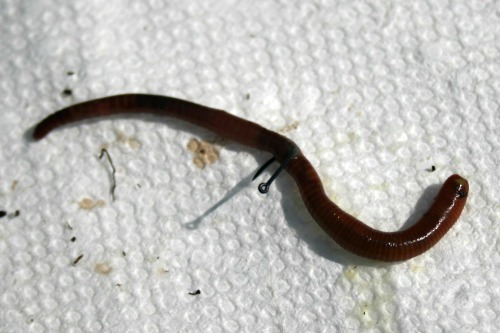The Unbelievable Globe of Red Wigglers: Boost Your Dirt Fertility Today
The function of red wigglers, or Eisenia fetida, in enhancing soil fertility is a subject of growing interest among gardeners and agricultural specialists. These little yet efficient microorganisms transform natural waste into beneficial worm spreadings, substantially boosting soil health and advertising sustainable techniques. As we check out the advantages of vermicomposting and the functional actions to produce an effective worm container, the potential effect of these worms on your gardening success ends up being increasingly noticeable. Comprehending the subtleties of their care and application might just change the means you approach dirt management. What insights can be obtained from incorporating these amazing animals into your horticulture regimen?
Understanding Red Wigglers
Red wigglers, scientifically understood as Eisenia fetida, are a varieties of earthworm that play a vital duty in enhancing soil fertility. These worms prosper in organic-rich environments, such as compost heap and rotting plant product, where they eat natural waste and excrete nutrient-dense castings. Their distinct composition, including a fractional body and a clitellum, permits them to reproduce rapidly and effectively process big amounts of organic matter.

The environmental importance of red wigglers extends past simple waste processing; they add to the soil food internet, promoting a diverse area of bacteria that additionally boost soil wellness. Comprehending the biology and actions of red wigglers is essential for using their complete capacity in lasting agriculture and horticulture practices.
Advantages of Vermicomposting
(Red Wiggler Express)Utilizing the power of red wigglers via vermicomposting offers many benefits that dramatically boost soil health and wellness and fertility. Among the main benefits is the production of nutrient-rich worm castings, which are an exceptional natural fertilizer. Red Wiggler Express. These spreadings contain vital nutrients like nitrogen, phosphorus, and potassium, advertising durable plant development and improving plant returns
The visibility of worm castings enhances soil structure, enabling for much better water retention and drain. Red wigglers assist damage down organic matter, accelerating decomposition and recycling nutrients back right into the dirt.
Vermicomposting also promotes microbial task, which is crucial for a healthy and balanced dirt ecological community. Beneficial microbes grow in the visibility of worm spreadings, assisting in the malfunction of natural materials and improving vitamins and mineral schedule to plants.
Last but not least, vermicomposting acts as an efficient waste administration service, decreasing landfill waste by recycling kitchen scraps and various other natural materials. This not only adds to environmental sustainability yet likewise promotes a circular economic climate within gardening and farming.
How to Establish a Worm Container
Establishing a worm bin is an uncomplicated procedure that can substantially enhance your composting initiatives. Begin by choosing a suitable container, which can range from a commercially available worm bin to a simple plastic or wood box (Red Wiggler Express). Make sure the container has sufficient air flow; little openings in the lid and sides will certainly assist in air circulation
Following, produce a bed linens layer to provide a comfortable setting for the red wigglers. This can be made from shredded newspaper, cardboard, or coconut coir, moistened to a damp, sponge-like consistency. Load the container to around one-third full with this bedding product.
As soon as the bed linen is prepared, it's time to introduce the worms. Red wigglers flourish in organic waste, so location them carefully onto the bedding. Cover the worms with a light layer of extra bed linen to aid them adapt.
Feeding Your Red Wigglers
Offering the appropriate food for your red wigglers is essential for their health and wellness and the efficiency of your composting system. Red wigglers flourish on a different diet regimen, largely including natural materials such as vegetables and fruit scraps, coffee grounds, and shredded paper. These materials not only provide vital nutrients but also add to the microbial task in the worm container, which is crucial for the worms' digestion.
It is vital to avoid certain foods, such as milk items, oils, and meats, as these can attract insects and develop undesirable smells. Furthermore, citrus peels and extremely spicy foods ought to be limited due to their possible to hurt the worms. A balanced technique to feeding entails keeping an eye on the quantity of food presented to the container, making certain that it is consumed within an affordable amount of time to stop pop over to these guys excess waste buildup.
To promote ideal digestion, it is advantageous to slice or shred bigger food products prior to including them to the container. This method boosts the surface for microbial activity, facilitating quicker decomposition and enhancing the overall effectiveness of your composting system. On a regular basis observing the worms' feeding behaviors will certainly aid you readjust their diet regimen as needed.
Utilizing Worm Spreadings in Your Garden

(Red Wiggler Express)Incorporating worm castings right into your yard can be achieved by mixing them right into the dirt or using them as a top dressing. The slow-release nature of these spreadings makes sure that nutrients are offered to plants over an extended duration, minimizing the requirement for artificial plant foods. Furthermore, worm spreadings have helpful bacteria that advertise healthy and balanced soil ecosystems, improving the overall strength of your garden.
To optimize the benefits, purpose to apply approximately one component worm castings to 3 parts dirt in your planting beds. Normal applications can bring about improved crop yields and healthier plants, making worm spreadings an important source for both novice and experienced garden enthusiasts alike. By using this all-natural change, you can grow a flourishing garden while contributing to sustainable horticulture techniques.
Final Thought
In verdict, red wigglers exhibit the vital role of vermicomposting in improving soil fertility. Their capability to convert organic waste right into nutrient-rich spreadings dramatically improves dirt framework and supports microbial variety.